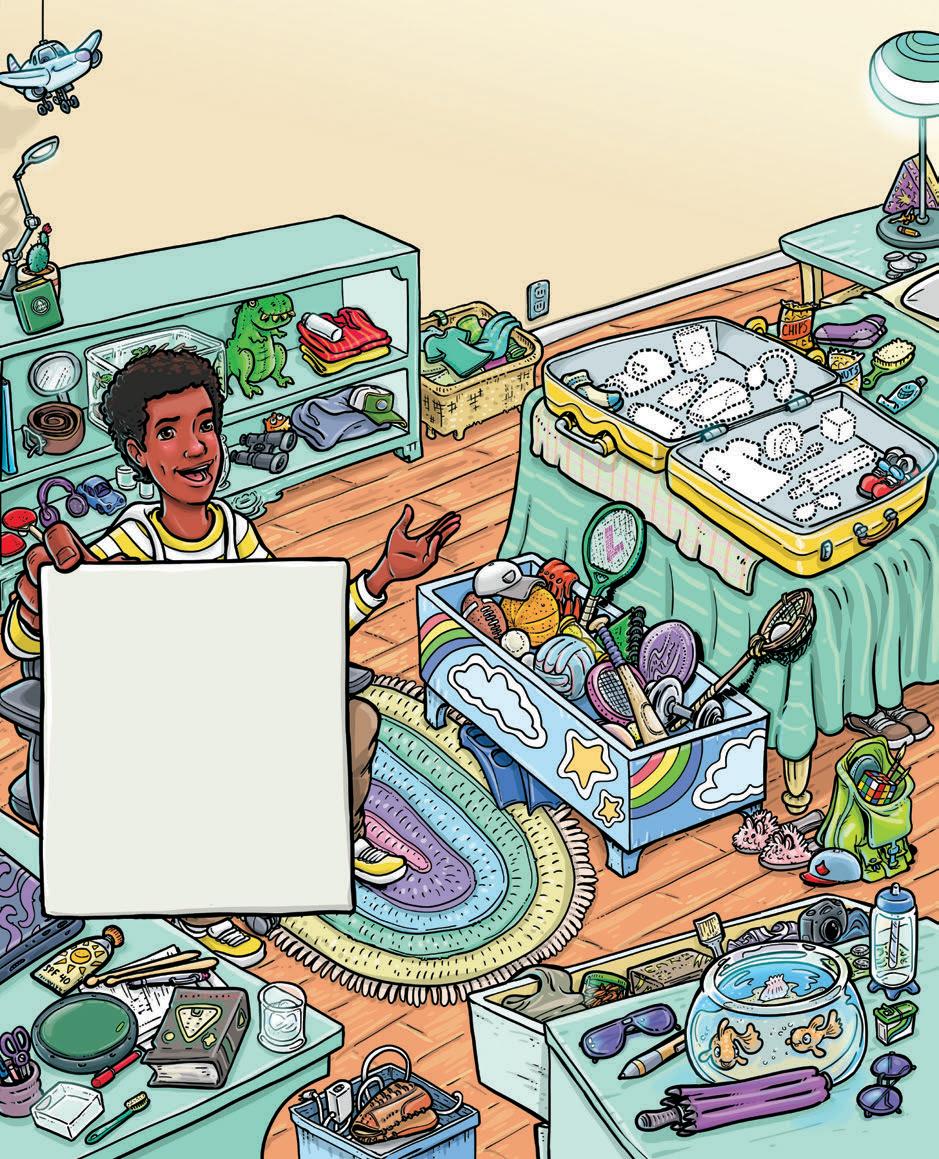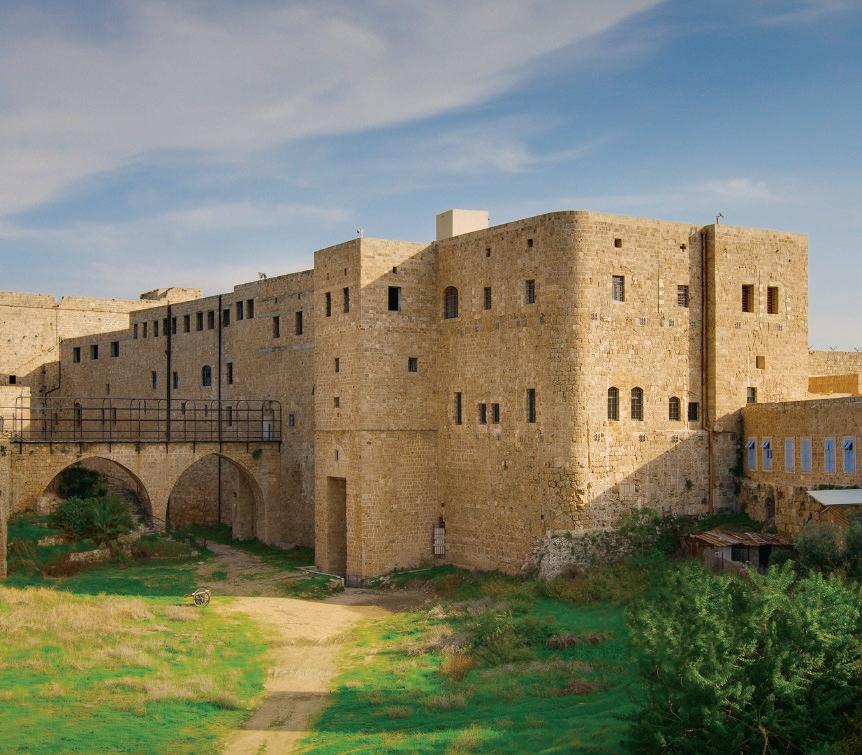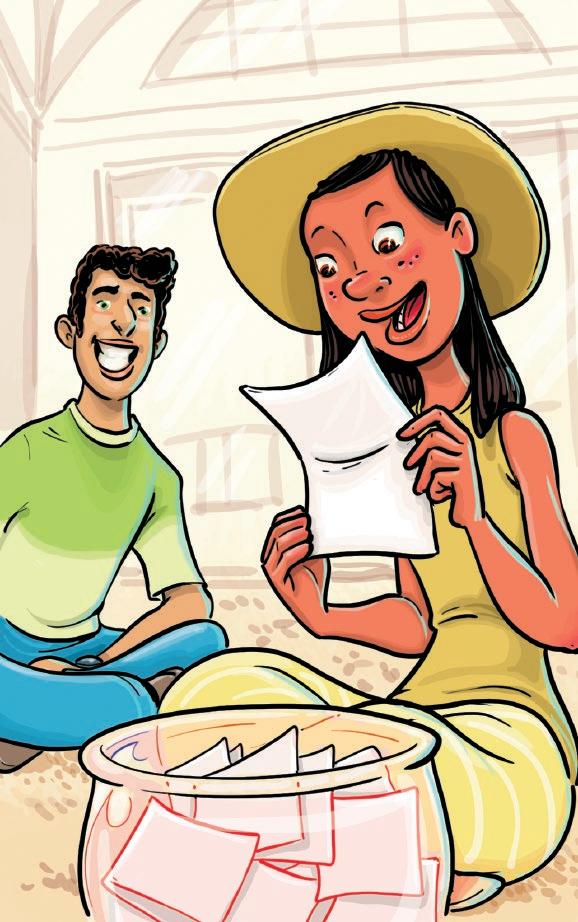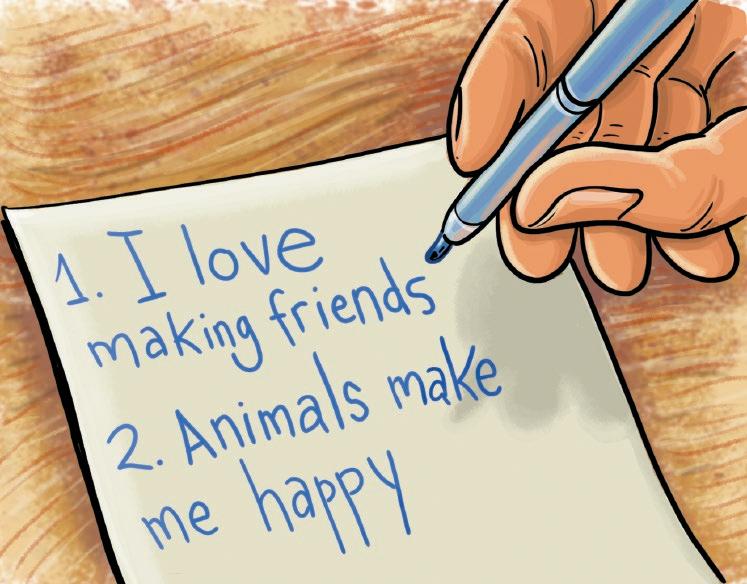
BAHÁ’Í NATIONAL CENTER
1 2 3 3 C ent ra l Street, Evanston, I llinois 60201 U S.
8 47. 733 . 3409 brilliant@usbnc.org
Subscriptions: 1.800.999.9019 brilliantstarmagazine.org


BAHÁ’Í NATIONAL CENTER
1 2 3 3 C ent ra l Street, Evanston, I llinois 60201 U S.
8 47. 733 . 3409 brilliant@usbnc.org
Subscriptions: 1.800.999.9019 brilliantstarmagazine.org
Amethel Parel-Sewell EDITOR/CREATIVE DIRECTOR

C. Aaron Kreader DESIGNER/ILLUSTRATOR

Amy Renshaw SENIOR EDITOR
Heidi Parsons ASSOCIATE EDITOR
Darcy Greenwood ASSISTANT EDITOR
Foad Ghorbani PRODUCTION ASSISTANT
Lisa Blecker ARTIST & WRITER
Donna Price WRITER
Copyright © 2023 by the National Spiritual Assembly of the Bahá’ís of the United States 8 4
Dr. Stephen Scotti STEAMS EDUCATION ADVISOR*

MANY THANKS TO OUR CONTRIBUTORS:
Katie Bishop • Heather Coletti • Celeste Cortés
Eleanor Davis • Amy Guerra • Elijah Jennings
Layli Kline • John Leyba • Nabil Mato
Dr. Sarah McAnulty • Dr. Mansur Nurdel
Kaelum Parham • Sandy Puć • Sami Stefan
Benin Tamiru • Tabor Weatherdon
Dr. Benjamin Weitzman • Dr. Jamie Womble
Roger Wood
ART AND PHOTO CREDITS
Illustrations by C. Aaron Kreader, unless noted



By Lisa Blecker: Photos on pp. 8– 9
Historical photos courtesy National Bahá’í Archives, unless noted
STORY AND ACTIVITY CREDITS
By Amy Renshaw: 7, 11, 14, 26, 27, 29
By C. Aaron Kreader: 3

By Heidi Parsons: 1, 10, 16, 22, 28
By Darcy Greenwood: 1, 2, 6, 12, 19, 20, 24, 29
By Lisa Blecker: 8, 13
By Donna Price: 3, 11, 12, 13, 14, 26, 28
By Katie Bishop: 4, 10, 21, 25, 26, 27
SUBSCRIPTION RATES AND RENEWALS
To subscribe, visit brilliantstarmagazine.org or contact Bahá’í Subscriber Service: Toll-free: 1.800.999.9019 / Email: subscription@usbnc.org
Standard U.S. rates: $18 (One year); $32 (Two years)
Inte r national airmail: $38 (One year); $68 (Two years)
Canada and Mexico: $28 (One year); $48 (Two years)
RIGHTS, PERMISSIONS, AND CLASS USE

All content in Brilliant Star is copyrighted by the National Spiritual Assembly of the Bahá’ís of the U.S. or by individual contributors. For permission to copy or translate, use form at brilliantstarmagazine.org/permission-request or write Brilliant Star, 1233 Central St., Evanston, IL 60201. Teachers may photocopy pages in limited quantities for classroom use. “Brilliant Star” and volume/number or issue date must be present on all copies, and proper credit given to the copyright owner.
Brilliant Star empowers kids to explore their roles as world citizens. Inspired by the principles of peace and unity in the Bahá’í Faith, we encourage readers to use their virtues to make the world a better place.

The Bahá’í Faith is the second most widespread religion in the world, with over five million Bahá’ís. It was founded by the Prophet Bahá’u’lláh (“Glory of God” in Arabic) in 1863. Bahá’u’lláh taught that all people are part of one human family, and all religions come from one God. Bahá’u’lláh’s eldest son, ‘Abdu’l-Bahá, interpreted His teachings and led the Bahá’í community after Bahá’u’lláh’s passing. Today, Bahá’ís work to bring love and justice to the world, and end prejudice and discrimination of all kinds.
Bahá’u’lláh’s Life: Mission of Peace
Mírzá Músá was His devoted brother and helper.
Nur’s Nook
Create a welcoming door to your home and heart.
We Are One
Explore and care for the place we all call home.
Maya’s Mysteries
Create art while exploring nature’s diversity.
Lightning and Luna: Episode #95
The Erasers power up a shocking new plot!

Radiant Stars
Get to know kids who shine, like you.
Stargazer: Dr. Mansur Nurdel
He fled persecution and focused on a new vision.
Riley’s Rainforest
A family that dines together shines together!
Shining Lamp: Soo Fouts
She was full of passion for sharing the Faith.

Cosmo’s Corner
A crossword and more from our favorite chameleon
A-MAZE-ing ADVENTURE
Fun, fresh air, and family unity at camp
* Learn more about STEAMS
Geometric stars by Markovka






What
Stuart

Life with your family and friends is a big adventure. Together, you experience small moments every day and big milestones that might happen once in a lifetime. You enjoy fun celebrations and work through tough challenges. You grow and learn together. No matter where your journey takes you, you have companions to help you on your path.
In this issue, discover how you can strengthen bonds of unity with your family and with your community. Craft a welcoming door with Nur to get to know your neighbors. Dive through small talk and learn ways to deepen your conversations. Quiz yourself on handling conflicts. Share memorable stories with your family. Play group games to create fun camaraderie. And meet Dr. Mansur Nurdel, who fled persecution in Iran and risked his life to serve the Bahá’í Faith.
Every act, from helping a sibling pack their suitcase to hosting a housewarming party for a neighbor, can help you along your journey to harmony. With love, patience, and a spirit of service, our families and communities can soar with unity.


LOVE,

Yay! There’s so much to celebrate in our families and communities. We can appreciate accomplishments like winning a trophy in a track meet or learning a new piano solo. Everyone has uplifting qualities, from hilarious humor to fantastic friendliness.
Throwing a party is fun, but you can applaud your friends
and family in simple ways, too. Give a hug, write a kind note, or cheer at their soccer game to give them a boost. Offer love and support with no strings attached. Don’t deflate someone’s spirit if they make a mistake—they can learn from the experience. When we focus on the positive and encourage people around us, everyone’s spirits can soar!
Match pairs of balloons to find nine words that help us celebrate and support our friends and family.
Write your answers here!

Do you pack with careful planning, or do you pack at the last minute? Either way, traveling is a great way to discover what you truly need. Limiting what you bring along can help you focus on fun experiences instead.
Like the puzzle of fitting your stuff in a suitcase, it can take effort for a family or community to work together in harmony.
Somebody’s words might poke at you like sharp edges. You may feel crowded by someone with a personality that’s different from yours. If your feelings get squished, speak up with kindness and consult about making space for everyone.
For all of life’s adventures, pack your patience, empathy, and compassion. And it’s fun to bring extra snacks to share!

• Pack as light as possible.
• Check the weather for your destination.
• Research the culture to find out what clothing is appropriate.
• Create a list of essentials.
• Bring clothes you can wear in layers and that go well together.
• Bring comfortable shoes.
• Stay organized with packing cubes or another system.
• After you pack, review to see what you can leave behind.
What travels around the world but stays in one corner? A stamp!The highlighted area marks the time in which this story takes place.
Who do you count on to stick with you through hard times? For Bahá’u’lláh, one of those people was His younger brother, Mírzá Músá.
1817 November 12
Birth of Bahá’u’lláh in Tihrán, Iran
1844
Recognizes the Báb as a new Messenger of God
1852
Imprisonment in the “Black Pit” of Tihrán
1853–1863

Exile in Baghdád, Iraq. From 1854–1856, He goes into the mountains to pray in solitude.
1863 April
Declares Divine Mission as Prophet-Founder of the Bahá’í Faith
1863–1868
Exile in Constantinople (Istanbul), then Adrianople (Edirne), Turkey. Begins writing letters to kings and rulers in 1867, urging world unity
1868
Last exile, to prison-city of ‘Akká, Israel
1877
Finally free to live in countryside homes of Mazra‘ih and then Bahjí, outside ‘Akká
1892 May 29
Bahá’u’lláh passes away at Bahjí.
Even as a little kid, Mírzá Músá was devoted to Bahá’u’lláh, Who showed him great love and kindness. When their father, Mírzá Buzurg, passed away, Bahá’u’lláh cared for His siblings and mother. He provided a home for them and helped His younger brothers learn writing, spelling, and calligraphy. Mírzá Músá adored Bahá’u’lláh, and for his entire life, his attachment never wavered.
From the earliest days of Bahá’í history, Mírzá Músá was at Bahá’u’lláh’s side. When a new Messenger of God named the Báb shared teachings to guide humanity, He sent some of His writings to Bahá’u’lláh. Mírzá Músá greeted the messenger at the gate of their family home and took the tablet to Bahá’u’lláh.
After reading, Bahá’u’lláh said, “Músá, what have you to say?” Both brothers accepted the new Faith and became Bábís. Years later, when the Báb was martyred, Mírzá Músá helped keep His sacred remains hidden until they could be safely laid to rest in Haifa (now in Israel).
In 1852, Bahá’u’lláh was arrested because He was a Bábí. Mírzá Músá helped care for Bahá’u’lláh’s family while He was in prison. After Bahá’u’lláh’s release, Mírzá Músá joined Him in exile from their home in Persia (now Iran) to Baghdád (now in Iraq).
In Baghdád, Bahá’u’lláh declared that He was the Messenger of God foretold by the Báb. He shared teachings to help bring world peace. Building unity in the family
In this prison in ‘Akká, Israel, Mírzá Músá helped ‘Abdu’l-Bahá tend to the sick Bahá’ís.

is an important part of that. Bahá’u’lláh urged us to be as unified as “the fingers of one hand, the members of one body.”
Mírzá Músá devoted himself to serving the Bahá’í Faith. The family was exiled three more times as authorities tried to stop Bahá’u’lláh’s message of peace. If disunity arose in their family or community, Mírzá Músá was trusted to resolve it with justice.
Mírzá Músá deeply loved his nephew, Bahá’u’lláh’s eldest son, ‘Abdu’l-Bahá. Together they tended to the sick and met with government and religious leaders to share Bahá’í teachings. ‘Abdu’l-Bahá called his uncle a “true brother” to Bahá’u’lláh.
Mírzá Músá passed away in ‘Akká (now in Israel) in 1887. ‘Abdu’l-Bahá said, “He remained steadfast, under all conditions, to the very end. Unto him be praise and salutations . . . upon him be mercy and grace.”



Give each person a ping-pong ball with a different get-to-know-you question written on it in permanent marker. Everyone stands in a circle and bounces the balls back and forth. After two minutes, players read aloud and answer the question on the ball they’re holding.
Give everyone a blank sheet of paper and a pencil or pen. Invite friends to write a short, oneparagraph story about an act of kindness someone did that had a big impact on them. Do not write names on the paper. Fold the stories and put them in a bowl. Mix the stories up, then ask each player to take a story from the bowl. Each person reads aloud the story they selected. After all stories are read, group members guess the author of each one.
Give a prompt that includes at least some folks in the group. Then ask everyone to mingle and talk until they can split into smaller groups based on the prompt. Examples:
• People who play the same sport or have the same hobby
• People who have the same favorite season
• People who have the same number of siblings
Give everyone a blank piece of paper and a pencil. Each person writes two facts that they want to share about themselves. Place all papers in a bowl. Take turns pulling a paper from the bowl and reading it out loud. After each one is read, the group guesses who wrote it.

“One should wish for one’s brother that which one wisheth for oneself.” — Bahá’u’lláh
Dolphins are amazing communicators! Their language of whistles and clicks is so complex that humans haven’t been able to crack it! Scientists think dolphins talk about lots of things, from facts like their age to how they feel. They swim in groups, or pods, of up to 30. Pod members hunt together, protect each other, and teach each other how to use tools to catch food.
Communication is crucial for human families and friends too. Sometimes it’s easy to make small talk and just skim the surface. That’s a good place to start, but we can dive deeper to strengthen our relationships. Be a good listener and ask questions. Curiosity, kindness, and positivity can help you swim along. Check out the tips below. How do you deepen your conversations?

“What bounty greater than this that science should be considered as an act of worship and art as service to the Kingdom of God.”
Baking in the blazing sun, the village of ‘Adasiyyah (now in Jordan) was overgrown with thorny bushes and trees. But when he purchased it, ‘Abdu’l-Bahá, the leader of the Bahá’í Faith, envisioned a vibrant future.
In 1907, he invited Bahá’ís from Persia (now Iran) to farm the land. Unlike landowners who gave tenants a meager living, he allowed them to keep 80% of the farm’s income. The rest was used for the Shrines of Bahá’u’lláh and the Báb.

“Agriculture is a noble science .” ‘Abdu’l-Bahá said. He visited the farmers and joined their Bahá’í gatherings. He encouraged them to plant diverse fruit trees, vegetables, and grains. They were inspired by his kindness and wisdom.
In time, the fields and orchards thrived. Fragrant orange, lemon, pomegranate, and other fruit trees
covered the land. Wheat, beans, eggplant, cabbage, and many more crops fed the farmers’ families, and the surplus was sold.
‘Abdu’l-Bahá obtained banana plants from India and helped the farmers nurture them. Bananas were new to the area—people didn’t even know they had to remove the peel to eat them! But soon they were popular and profitable.
The village became so successful, the government of Jordan considered it a model community. During World WarI, it contributed wheat to feed hundreds in Haifa and ‘Akká (now in Israel).
With perseverance, the people of ‘Adasiyyah cooperated to put into action ‘Abdu’l-Bahá’s guidance: “All effort and exertion . . . is worship, if it is prompted by the highest motives and the will to do service to humanity.”
—‘Abdu’l-BaháPhoto: Bahá’í International Community; Art: kiyanochka/Getty